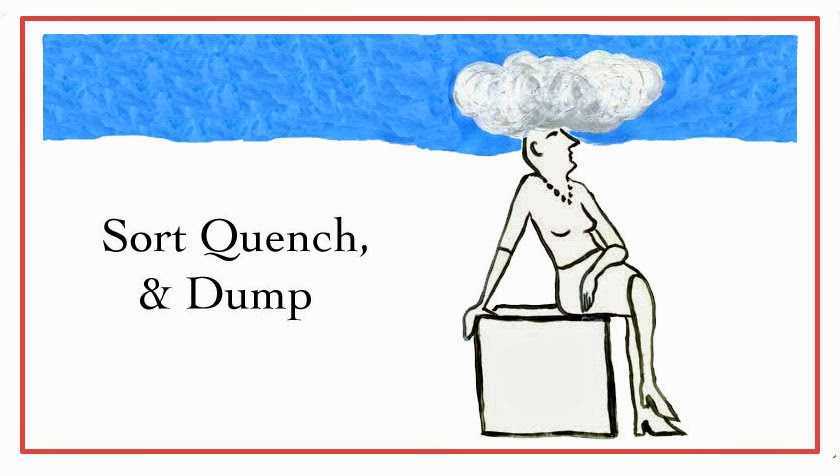Along with failing to cheer her up, I was cleaning and purging her food cabinets and freezers. (At a later date we will discuss the plague of pantry moths that presaged my father’s death.) I defrosted some steak and that evening I was cooking it in the frying pan, along with butter, salt & pepper. The truth is that I almost never cook steak, no not almost, actually never. If we have steak at home CSB cooks it on the grill. This steak I was cooking generated quite a lot of smoke, so much smoke that I thought it might be a good idea to remove the frying pan from the burner and hold it out the back door for a few moments, because in case I neglected to mention it earlier, there is no exhaust fan in my mother’s kitchen. In former times it was possible to close the door to the back stairs, and thereby prevent the smoke from rising to the smoke detector at the top of the stairs, causing the alarm to alert the local fire department while emitting a piercing screech that would have not have disgraced a mosh pit of love-addled teenage girls; but about 6 months ago a Stairlift was installed for my father, and in order to fit all the machinery of the Stairlift (a device also much enjoyed by grandchildren) it was necessary to remove the door to the back stairs. So now there was nothing to impede the ascension of smoke.
My mother’s is an excellent kitchen, except for the electric stove, which I loathe, and the plague of pantry moths, and my mother’s insistence on storing her salad spinner in a nuclear bunker in Utah; but the lack of a fan coupled with low ceilings, has been known to cause problems.
And it did, once again, cause problems.
Waving the erupting pan of steak outside in the chilly air was too little, and too late. The alarm began to blast, and it continued to blast. I reassured my mother that the house was not on fire, but dinner might be late. She went down to the basement intending to hit the reset button on the alarm system.
At the bottom of the basement stairs (yes, the same basement where I have discovered such treasures as 87 empty Bonne Maman jam jars, a wad of 1919 Deutschmarks, and a collection of broken Dresden Christmas music boxes) if you turn left you encounter the control panel for the alarm system, and if you turn right you encounter the electrical panel. My mother turned right and flipped a breaker switch. The lights went off somewhere, but the noise did not stop. She flipped another breaker switch. More lights went off, but still no silence. She repeated flipping breaker switches until the entire house was in darkness, and still the alarm blasted.
Then the firemen arrived.

Have I mentioned that Captain Bill P. of the Hingham Fire department is a dear friend of the Aged P’s, and mows their lawns and stores his vast collection of farm machinery in their lower barn, and that his dog Duke is the only dog allowed upstairs? Perhaps I have not, in which case, I do now. Captain Bill and three other firemen arrived in full fire regalia, but we couldn’t initially appreciate their outfits, because the lights were out. Attempting not to feel & appear a complete fool, I told Bill that the steak had created all the smoke and that the house was not otherwise burning up.
But he noted the absence of lights, or the darkness, and being a fireman he drew the obvious conclusion, which was not at all obvious to me, and thought there might be an electrical fire inside the walls. And this would be a bad thing. So Bill headed to the basement, while the other firemen went in different directions, because that is what firemen do. As they dashed past they stopped, and said to my Mother, and then to me: “I am so sorry for your loss.” Then they continued dashing and seeking the source of the smoke and all this trouble.
Bill of course went straight to the alarm control box and hit the off button, and lovely silence swaddled the dark house. He then, aided by a fire department issue flashlight, examined the electrical panel, realized all the breakers were popped and drew the correct conclusion. Light followed upon silence. One of the firemen, who had earlier offered me his condolences, reappeared and told me he had gone to grammar school with my cousin Johnny. Like Johnny, he was a large man, but beardless.
The strangest thing was that the steak was not burnt, and was in fact quite edible. Once the smoke had cleared, we dined with relish and toasted the cow.











